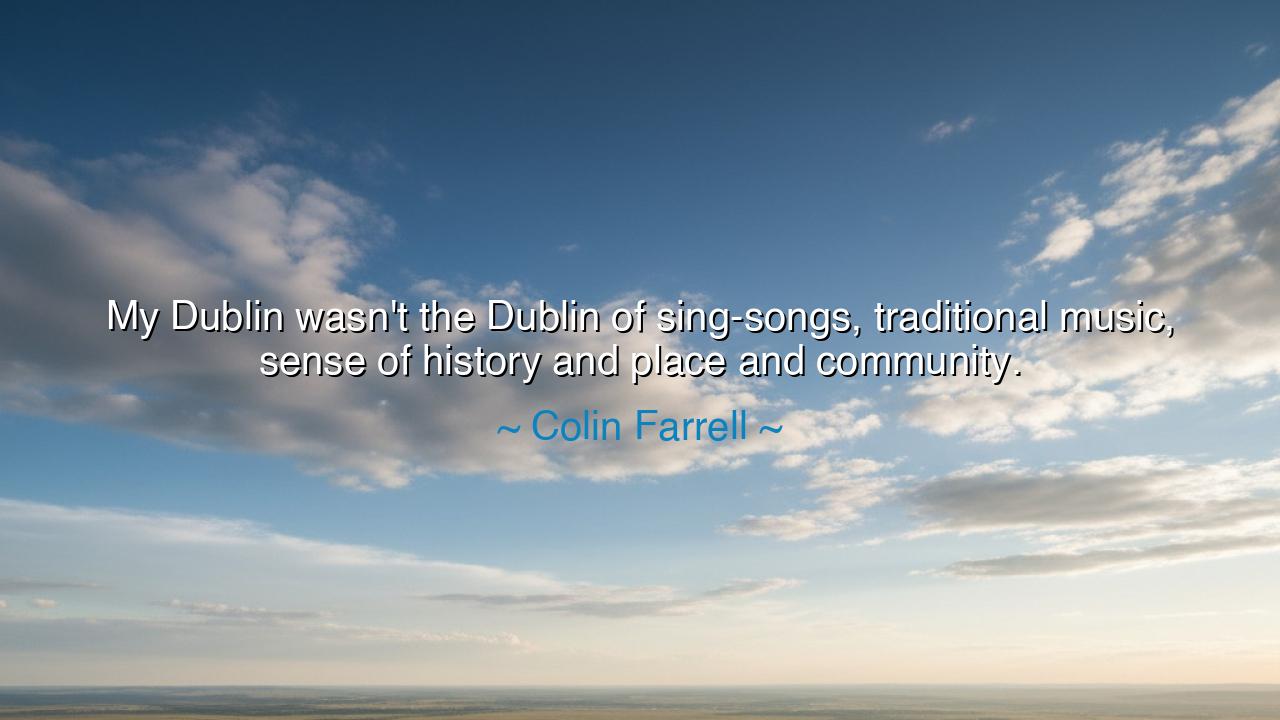
My Dublin wasn't the Dublin of sing-songs, traditional music
My Dublin wasn't the Dublin of sing-songs, traditional music, sense of history and place and community.






In the words of Colin Farrell, one of Ireland’s most soulful sons, we find a reflection that is both personal and universal: “My Dublin wasn’t the Dublin of sing-songs, traditional music, sense of history and place and community.” These words carry not bitterness, but awakening — a recognition that the city of one’s birth is not always the city of myth. It is a confession from a man who grew up not in the warm glow of nostalgia, but in the raw light of reality — where beauty is found not in romance, but in truth. For in this line, Farrell speaks not only of Dublin, but of the eternal struggle between memory and modernity, between what a place once was and what it has become.
The origin of this sentiment lies in Farrell’s own upbringing, in a Dublin far removed from the green, musical image celebrated by poets and travelers. The Ireland of his youth was shifting — its traditions thinning, its streets echoing more with ambition and struggle than with laughter and song. His Dublin was not the one of the postcards — not the land of fiddles and folklore, of fireside stories and communal dance — but a city where the old melodies were fading beneath the hum of engines and the ache of urban survival. In that contrast — between myth and experience — Farrell discovered a deeper kind of identity, one forged not by heritage alone, but by confrontation with change.
To say “My Dublin wasn’t the Dublin of sing-songs” is to acknowledge that every generation inherits a city — or a world — already altered. The elders speak of what was, the poets sing of what should be, but the youth live in what is. Farrell’s Dublin was one of transition — of streets where tradition gave way to modernity, where community dissolved into anonymity. Yet, in recognizing this loss, there is also courage. For the first step in reclaiming one’s sense of place is to face the truth of its absence. Many would pretend that their homeland still gleams as legend claims; Farrell, instead, speaks honestly — and in that honesty, he honors both the past and the present.
There is an echo of this truth in the tale of James Joyce, another Dubliner who wrote not of Ireland’s dream, but of its dissonance. Joyce’s Dubliners exposed the paralysis of a city caught between faith and doubt, tradition and progress. Like Farrell, Joyce loved Dublin not blindly but completely — enough to see its flaws, its silence, its smallness, and still call it home. Both men remind us that to love one’s origin is not to worship it as perfect, but to understand it as living — to see that a city, like a person, grows, forgets, stumbles, and strives to begin again.
Farrell’s Dublin is, therefore, not a rejection of Ireland’s spirit, but an evolution of it. Where the old songs once spoke of heroes and fields, the modern city sings in different tones — of survival, of individuality, of fractured dreams. It is still Ireland, still Dublin, but painted in new colors: darker, perhaps, yet deeper. In the fading of communal traditions, there arises a new kind of artistry — one born from struggle and solitude. Farrell himself, emerging from this urban Ireland, carries within him that tension — between loss and creation, between what was sung and what must now be spoken.
Yet, there is also a warning here — a call to remember. For when a people lose their sense of history and place and community, they risk drifting without anchor. Farrell’s words are not a lament for tradition’s end, but a reminder of its importance. The songs and stories of old Dublin were more than entertainment; they were the threads of belonging. And though his Dublin lacked them, his awareness of their absence became his inheritance — the spark that led him to seek meaning elsewhere, through art, through film, through the telling of modern Irish stories in a global tongue. In this, he continues the tradition in his own way, carrying the essence of Ireland — not as it was, but as it endures — into new realms of expression.
Therefore, my listener, let this be your lesson: your home is not always what the world says it is. Do not mourn if your birthplace is not as the songs claim, for every generation must write its own verse. Whether your Dublin is filled with song or silence, your task is the same — to look upon it with honesty, to love it for its truth, not its legend. Seek not to imitate the past, but to understand it, and to build upon it something new, something worthy. For the spirit of a place is not kept alive by nostalgia alone, but by those who live it with awareness.
And so, as Colin Farrell reminds us, even in a world where the old harmonies have quieted, there remains the power of voice — the voice that remembers, the voice that questions, the voice that creates anew. The Dublin of sing-songs may fade, but the Dublin of the human heart — of struggle, resilience, and hope — lives on. Wherever you dwell, whether in city or silence, carry your place within you — not as it was told, but as you have seen it. For that is how tradition lives: not in repetition, but in renewal.






AAdministratorAdministrator
Welcome, honored guests. Please leave a comment, we will respond soon